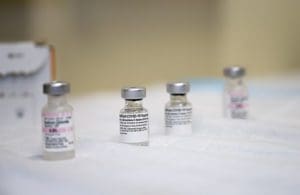
Doses of the COVID-19 vaccine at Walter Reed National Military Medical Center, Bethesda, Md. DoD photo by Lisa Ferdinando.
British researchers report that using distinct COVID-19 vaccine types for the first and second doses appears to be effective, according to a preprint study in The Lancet.
As global health authorities seek to vaccinate as many people as possible, a potential hurdle is the need to use identical vaccines for the prime and boost stages. Using a so-called heterologous prime-boost vaccination would enable more rapid vaccination, but data about the efficacy of such a strategy have been scarce.
In the recent study, researchers randomized 830 adults 50 and older into eight groups to receive the varying combinations of the AstraZeneca and BioNTech-Pfizer vaccines.
To get a sense of the efficacy of the various combinations, the researchers used a geometric mean ratio (GMR) and geometric mean concentration (GMC) of serum SARS-CoV-2 anti-spike immunoglobulin G levels.
The study concluded that the immunity 28 days after administering the second dose was non-inferior when using an AstraZeneca vaccine for the first dose and a BioNTech-Pfizer shot for the second.
Trial recipients who received two doses of the Pfizer-BioNTech vaccine had antibody levels approximately 10 times higher than those who received two doses of the AstraZeneca vaccine. Those who received first the Pfizer and then the AstraZeneca vaccines had antibody levels about five times higher than those who received two doses of the latter vaccine. Meanwhile, those who received the AstraZeneca vaccine as a prime and a Pfizer boost had immune responses roughly comparable to those who received two doses of the Pfizer-BioNTech vaccine.
For recipients receiving a Pfizer-BioNTech vaccine for the first shot and an AstraZeneca shot for the second, the combination did not fare as well. The researchers concluded that they “failed to show non-inferiority of the heterologous schedule.”
Although the latter combination did not meet their non-inferiority criteria, combining the two vaccine types fared better than using the AstraZeneca vaccine for both the prime and boost.
Ultimately, according to Dr. Matthew Snape, a professor in pediatrics and vaccinology at Oxford University, any combination of the two vaccines is likely to offer strong efficacy.
One caveat is that mixing vaccine doses leads to more side effects, including headaches, chills and body aches, than using two identical vaccine doses.
The researchers are also gathering data on whether the AstraZeneca vaccine is more effective if the second dose is administered up to 12 weeks after the first dose. It is also likely that a third dose of the same vaccine will offer greater efficacy.